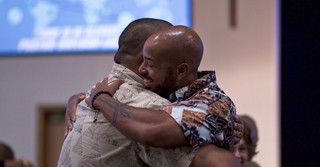5 Practical Ways to Overcome Evil with Good
Share

Paul taught his readership of new Christians in Rome “if your enemy is hungry, feed him; if he is thirsty, give him something to drink; for by so doing you will heap burning coals on his head. Do not be overcome by evil, but overcome evil with good” (Romans 12:20-21).
Here the evil (kakos) Paul refers to means “wrongs inflicted.” Paul addresses harm that has been done to his readers, and even the harm done by his readers, in the daily small actions of living in community. The Message translation puts it this way: “laugh with your happy friends when they’re happy; share tears when they’re down. Get along with each other; don’t be stuck-up. Make friends with nobodies; don’t be the great somebody” (vv.14-16).
Here are five practical ways to overcome evil with good, which emerge from Romans 20.
Photo credit: Unsplash/Erika Giraud

1. Laugh with Your Happy Friends
Happiness is not the purpose for which God placed us on earth, but he fills believers with joy. As Jon Bloom puts it, “hope in the glory of God’s grace, received by faith, fills us with deep joy in the Spirit.” While joy is more than happiness, we can feel happy in the midst of suffering when we remember who we belong to and what salvation means for us.
On the other hand, it is possible to quash potential happiness by overlooking the beauty of God’s provision or dwelling on everything negative. Paul – who knew persecution and suffering intimately – taught “whatever is true, whatever is honorable, whatever is just, whatever is pure, whatever is lovely, whatever is commendable, if there is any excellence, if there is anything worthy of praise, think about these things” (Philippians 4:8).
While we do not want to pursue happiness at the expense of righteousness, or to pretend that everything is okay when it isn’t, it would be wrong to overlook the good and pleasing gifts of a bright sunny day at the beach, a family party, or goofy game of five-aside. The crucial thing here is to give glory where it is due.
Furthermore, when we share happiness with one another, this is an opportunity to defy the evil of “wrongs inflicted” and its intention, which is to distract from the belief in God’s goodness and to rob a person of his peace in Christ. To laugh with your happy friends produces a natural opportunity to shine a spotlight on Jesus and to pursue him with greater fervor.
Is anyone cheerful? “Let him sing praise” (James 5:13). We overcome evil by being cheerful to the glory of God.
Photo credit: ©Getty Images/Fresh Splash

2. Share Tears with Sad Friends
But it is a cruel kind of cheerfulness, even a hurtful kind, which overlooks the sadness a person is experiencing. In John 11, when Jesus saw Mary weeping over the death of her brother Lazarus, Jesus “was deeply moved in his spirit and greatly troubled” (John 11:33). When one is tempted to try and fix a friend’s problem immediately, it is important to stop, take a breath, and first feel that friend’s pain. To rush past and try to ignore it, even with the best intentions, is to commit a wrong, an evil, which leaves the friend feeling unheard and uncared for.
Jesus can and certainly does fix our problems, although we will often have to wait for the ultimate fix of eternal rest and peace with him. In the meantime, whether or not there is an obvious solution, there is the opportunity to walk with someone through his or her pain.
Galatians 6:2 says “bear one another’s burdens, and so fulfill the law of Christ.” When we do this, the effect is manifold. For one thing, we can remind the sufferer that God also walks with his people when they suffer, and he knows what it feels like to suffer the way we do (Hebrews 4:15). Secondly, we can remind ourselves and each other that the Lord provides comfort when we are hurting the way a mother comforts her child (Isaiah 66:13). Thirdly, we can once again redirect attention towards the hope of Christ, which Satan wants suffering people to overlook in order that they might either drown in sorrow or turn, bitterly, away from Christ, believing that he does not care.
Photo credit: ©Getty Images/Rawpixel

3. Get Along with Everyone
Paul wrote in his letter that everyone should get along. The enemy loves to sow discord in a church, because “a house divided cannot stand” (Mark 3:25). Paul’s letters often address fissures which arose out of bad theology and pride. But, as Jon Bloom writes, the normal “pride-fueled conflicts” which plague any healthy, thriving church, can yield good fruit because “this gives us all opportunities to learn from each other and grow in grace. Negatively, we don’t always seize these opportunities, and sometimes they grow into various schisms.”
Overcome evil with good by addressing evil before it grows beyond conflict into a rift. “A soft answer turns away wrath” according to Proverbs 15:1. That is not necessarily agreement, but an approach to disagreement which demonstrates respect, and it implies that conflict of some kind is normal. Christians are exhorted not to avoid it but to use their opportunity. We must listen well. Our brother or sister might need to teach us something important. On the other hand, we might hear our brother or sister believing a lie which must be corrected.
But, at times we will also be tempted to disagree about trivialities. “Have nothing to do with foolish, ignorant controversies; you know that they breed quarrels. And the Lord's servant must not be quarrelsome but kind to everyone, able to teach, patiently enduring evil” (2 Timothy 2:23-24). The enemy rubs his hands together greedily when he sees a believer latching onto an argument for the sake of “winning,” even about something that is not important.
Photo credit: ©Getty Images/Rawpixel

4. Overcome Pride with Humility in Christ
“The fear of the Lord is hatred of evil. Pride and arrogance and the way of evil and perverted speech I hate” (Proverbs 8:13).
Paul puts it this way - “don’t be stuck up.” When we just want to be “right,” we will exalt ourselves with loud speeches and promote our personal intelligence to the point that others are demeaned or shut out. When we think too highly of ourselves, other people cannot speak, offer different opinions, or feel safe even trying to contradict us. When we see our leadership position as a place from which to take advantage of others, as a place for self-promotion, we taint the name of Christ as far as a watching world is concerned. The enemy has us where he wants us – reflecting a distorted image of the gospel.
The way to overcome the evil tendency to let pride grow in our hearts is to follow Christ’s example. “For even the Son of Man came not to be served but to serve, and to give his life as a ransom for many” (Mark 10:45). One idea perpetuated by rulers of cities or empires, yesterday and today, has been that leaders should be served. Jesus, Lord and Savior, flipped this notion on its head during his life and ministry, and then at the cross. If we are tempted to abuse our position, or we do not want to serve no matter what our position is, then we can remember Christ. He did not wait for the person in front of him to acknowledge who he was – Jesus healed and forgave, and then the person either followed or fell away. So often, his followers got their free bread and that was all they wanted, but that did not stop Jesus from giving it.
Photo credit: ©Getty Images/Suwaree Tangbovornpichet

5. Love Actively
The verbiage of Paul’s writing is active: “overcome.” In the Greek, this word is nikaó which means “conquer, prevail.” We overcome evil not merely by ignoring the wrongs done to us by our enemies, but by actively loving those who disagree with us, whether within or outside the church. We demonstrate the gospel rather than shouting about it. We “heap burning coals” on the person’s head by winning him or her over to the appeal of Jesus. This is not a way to laugh in their faces while they suffer, but a means by which we get their attention; those burning coals are a life-saving wake-up call, and the part that burns is their heart and mind as they wrestle with the truth and what it means for their lives.
Galatians 6:9 tells us not to get tired of doing good things; do not give up, there will be fruit, even though you cannot see it. The enemy in front of us is sometimes selfishness or discouragement. We want our own time and space. We get tired of “doing,” of taking time out of our days to help with odd jobs, with giving money, with volunteering to clean, cook meals, or babysit, especially if we hope the recipient will see Christ through our love. But is it love or duty that we are exercising? We need to be real, and therefore really show them that Christ is for them, actively, through his disciples. We follow Jesus’ example by continuing to pursue needy people with love and patience. When we joyfully put others first, we overcome internal enemies.
Two other evils can emerge from this pursuit which must also be conquered. They are bitterness and exhaustion. We might need to demonstrate healthy boundaries and self-care, even intelligent reflection, to get perspective about the motivations driving our actions and to show the reasonableness of our faith. Perhaps abuse is being perpetrated and stepping back is a healthy choice, even a good example if service has turned into enabling. The evil we conquer as Christians is not merely coming from “out there” – a lot of it emanates from ourselves.
Photo credit: ©Getty Images/Seventy Four

Proactive Army
The enemy is sometimes so small it sneaks into camp under cover of darkness. The enemy can be ordinary sins which tear relationships apart, like jealousy, malice, and pride. Or it feels like the enemy is the person closest to us, because only that enemy can really inflict damage.
But proactively engaging people as friends, brothers, and sisters can forestall or even prevent anyone from picking up arms. The writer of Hebrews instructs us to “stir up one another to love and good works” (Hebrews 10:24) and Paul tells the church at Thessalonica to “admonish the idle, encourage the fainthearted, help the weak, be patient with them all” (1 Thessalonians 5:14). We do this together if we want to successfully overcome evil, under the leadership and following the example of Jesus Christ, our ultimate conqueror of evil.
Photo credit: ©Getty Images/People Images
